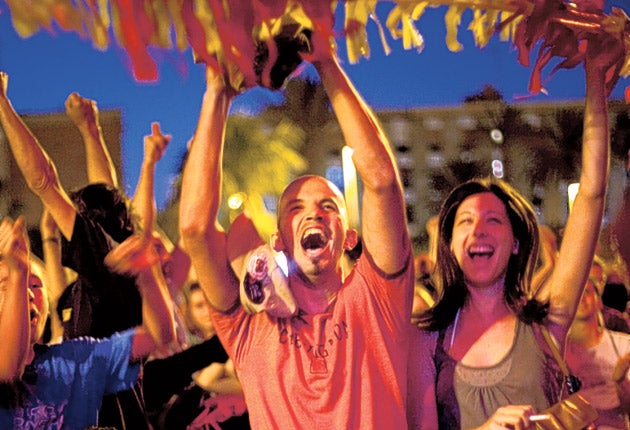Spain United: a team finally winning the heart of Catalonia
With seven locals to cheer, a region is rallying as never before

Your support helps us to tell the story
From reproductive rights to climate change to Big Tech, The Independent is on the ground when the story is developing. Whether it's investigating the financials of Elon Musk's pro-Trump PAC or producing our latest documentary, 'The A Word', which shines a light on the American women fighting for reproductive rights, we know how important it is to parse out the facts from the messaging.
At such a critical moment in US history, we need reporters on the ground. Your donation allows us to keep sending journalists to speak to both sides of the story.
The Independent is trusted by Americans across the entire political spectrum. And unlike many other quality news outlets, we choose not to lock Americans out of our reporting and analysis with paywalls. We believe quality journalism should be available to everyone, paid for by those who can afford it.
Your support makes all the difference.To celebrate or not to celebrate? That was the question at 10.15pm local time here in the Catalan capital on Wednesday night. True, Spain had just reached its first ever World Cup final – but, as the banners at any Barcelona v Real Madrid match proclaim: "Catalonia is not Spain."
To judge from the fireworks and car horns blasting out in Barcelona's city centre moments after the final whistle, most people didn't find the partying decision too difficult. The whole of Spain is suffering as la crisis (the credit crunch) bites hard, so why let questions of geography, socio- economics or politics get in the way of having a big fiesta?
Barcelona's mayor, Jordi Hereu, had decided not to mount a giant screen at any of the city's possible venues but that did not stop supporters of La Roja filling the streets and heading for the beach at the final whistle to celebrate a victory that was, after all, made in Barcelona – with seven of the 11 starting the semi-final playing for the Catalan giants.
The banners about Catalonia's independence will be back out for the first Real Madrid game next season and it was more a case of other voices being heard on Wednesday night rather than opinions changing, but for now Spain is united on the pitch and united in its celebration.
Situated in the north-east of the country and bordering France and the Mediterranean, Catalonia is one of Spain's 17 autonomous communities. What around half of its 7.5 million inhabitants want is not autonomy, though, but independence.
According to the latest survey around 30 per cent of Catalans want an independent state within a federal Spain while 20 per cent want a completely independent state totally apart from Spain.
The second scenario would certainly have made Wednesday night's victory a lot more difficult. The hero of the hour, Carles Puyol, would not have scored what the Barcelona daily La Vanguardia called "the goal that united Spain". The mop-haired defender and all-round team talisman would be playing for Catalonia and not for Spain.
Four of the 11 semi-final starters are Catalans, and without them the Spanish national team would lack its star midfield pairing of Xavi Hernandez and Sergio Busquets – the side's brains and the brawn respectively.
Neither would Puyol's defensive team-mate, the former Manchester United defender Gerard Pique, be able to play. Arsenal's Cesc Fabregas would be another absentee.
In fact, a Catalonia team does already exist but is not recognised by football's world governing body, Fifa, and only plays a couple of ceremonial friendlies a year.
But whatever the political persuasion of the region's football fans, a united Spain is obviously far stronger on the field than a divided one. Perhaps that is why the general feeling of goodwill carried on into yesterday as Catalans woke up to the prospect of a World Cup final. With unemployment rising and public spending falling, both at rates faster than anywhere else in Europe apart from Greece, there is little to shout about – so little wonder political nuances were forgotten as plans were made to spend Sunday on the beach and Sunday night in front of the television.
And if any Catalans were having trouble finding cause to celebrate, then the city's morning sports papers were reminding everyone that the victory had been as much for FC Barcelona as for Spain – not only had the region's flagship team provided the bulk of the starters, but the Spain coach, Vicente del Bosque, employed tactics that could have been lifted straight from the Barça coach Pep Guardiola's training manual.
"Spain's most red-and-blue team ever beats the all-powerful Germany" was the view of the football daily Sport – with the reference being to Barcelona's colours and not to the national team's.
More than 86 per cent of FC Barcelona's 173,701 members are Catalans. For them, Barça capturing the Champions League feels like winning the World Cup – and on Sunday they could have the best of both worlds with a team full of Barcelona players making Spain, and all its parts, world champions.
Join our commenting forum
Join thought-provoking conversations, follow other Independent readers and see their replies
Comments